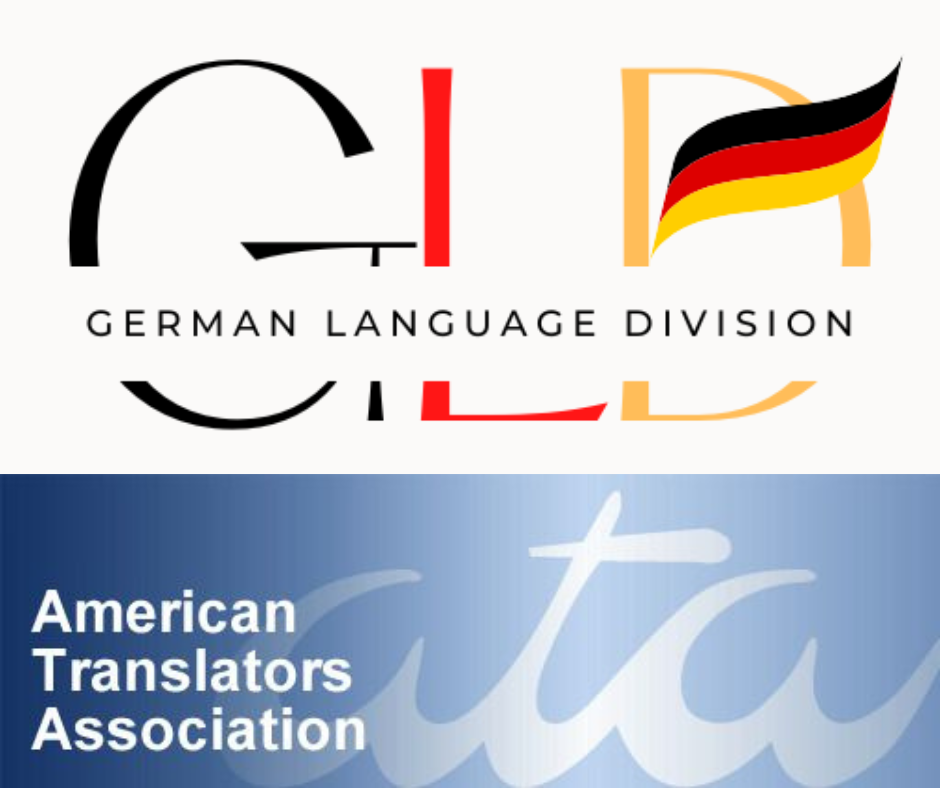If you search the GLD listserv messages from the past two-plus years, you will quickly notice the dominance of questions and statements regarding the seismic changes in the working environment experienced by the posters. The messages were particularly abundant in the run-up to ATA’s 63rd Annual Conference in Los Angeles; indeed, one member called for a “Town Hall” to discuss the future (and fate?) of the German-English/English-German translation and interpreting market in the face of so many members facing lulls in their business, which they in many cases attributed to their clients’ discovery and enthusiastic use of machine translation.
When it proved impossible to add a “Town Hall” to the conference program at short notice, GLD Administrator Karen Leube and Assistant Administrator Robin Limmeroth set out to find a way to poll GLD members about the state of their business and share outcomes with the ATA Board. When the opportunity arose to submit a proposal for a “Professional Forum” at ATA’s 64th Annual Conference in Miami, Karen jumped on it. The Professional Forum is a new session format launched at the latest conference which divisions can use to address pressing topics interactively.
To prepare for the Professional Forum, we set up a survey that ran from August 1, 2023, to September 25, 2023. The plan was to collate the survey results, report them to the Professional Forum attendees and use them as a starting point for discussion – and ultimately share the outcomes with ATA’s Board of Directors.
The survey included eight questions on the following topics:
- Employment status (self-employed or in-house employee)
- Services offered
- Client locations
- Respondents’ field(s) of work
- Change in income
- Reasons for decrease in income
- Reasons for increase in income
- Open-ended question encouraging respondents to share experiences, strategies, etc.
Kathryn DeVito at ATA Headquarters prepared the survey and sent it to all GLD members. In all, 117 members responded, constituting around 20% of the total membership. Kathryn collated the results, which Robin summarized for the Professional Forum presentation. Experienced market researcher that she is, Robin also collated all of the “verbatims” and included them in the presentation in the GLD Archive.
The Professional Forum took place on Saturday morning of ATA’s 64th Annual Conference, immediately after the Language Technology Division’s Professional Forum, which specifically addressed the impact of AI and machine translation on ATA members’ T&I business. The GLD Professional Forum was attended by around 50 people who were not necessarily GLD members.
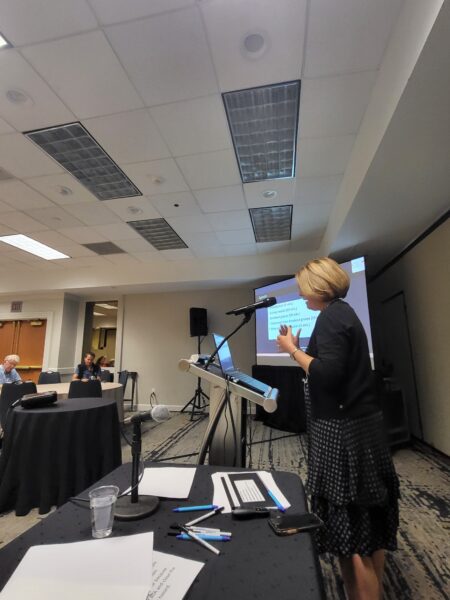
We introduced the Professional Forum by presenting the rough results of the survey:
1) Employment status:
99% self-employed, 1% in-house employees
It was remarked that many ATA members have dual status, which was not accounted for in the survey.
2) Services offered
The main services offered by the respondents were either DE<>EN/EN<>DE translation or translation review, followed by monolingual language services. 22.86% reported that they offered DE<>EN machine translation post-editing services (MTPE) and 16.19% said they offered EN<>DE MTPE services.
3) Client locations
The most frequently reported client location was the United States (76.42%), followed by Germany (72.64%), United Kingdom (26.42%), Switzerland (22.64%), and Austria (19.81%). Other client locations (28.30%) included Czech Republic, Spain (4), Ireland, Japan, Korea, Canada (6), Italy (3), Netherlands (2), Singapore, Poland (2), France (6), China (3), Latin America, South Korea, UAE, Estonia, Vietnam, Mexico, Romania, Peru, Luxemburg, India, Dubai, Israel, Greece, Sweden, Europe in general (2), International organization.
4) Fields of work
Respondents reported a wide range of fields of work, with “Legal”, “Technical” and “Health, Medicine and/or Pharmaceutical” reported most frequently.
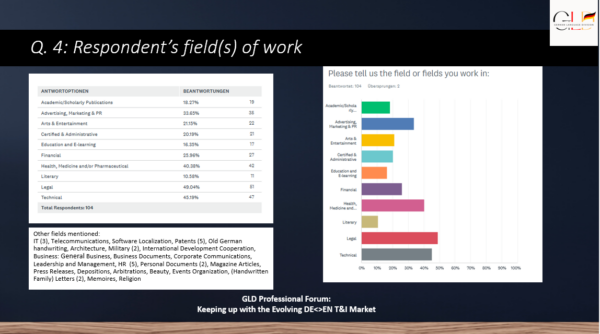
5) Change in income (compared to the previous year)
24.76% reported higher incomes than the previous year, 50.48% reported lower incomes and 24.76% said their incomes were more or less the same.
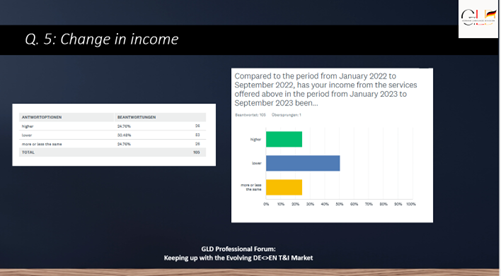
6) Reasons for lower income
The two main reasons for a drop in income over 2022 were either an overall downturn in the economy or clients using machine translation.
7) Reasons for higher income
Respondents attributed increases in income to stepping up their marketing efforts (27.27%), increasing their productivity through machine translation/AI (31.82%) or to an increase in work related to their usual specialty (63.64%) and to additional skills acquired through recent continuing professional development (22.73%).
8) Comments
Respondents took advantage of the opportunity to add comments and advice. The comments ranged from the prediction of the death of the industry and ever more use of MT(PE) by the clients themselves, as well as ways to find highly specialized niches, finding clients that appreciate value and the human touch and enlisting the help of ATA with client-facing materials to educate them about these values. While demographic data was not collected in the survey, a number of comments indicated that respondents were either retired or planning to retire (anyway).
Breakout groups
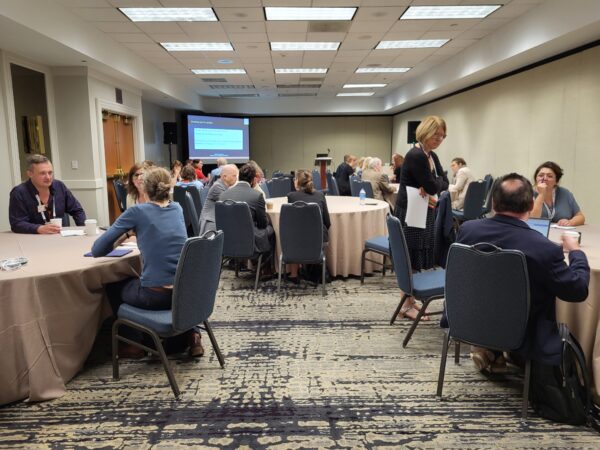
The main part of the Professional Forum was devoted to discussions in breakout groups addressing the following questions:
- Discuss the current state of your business. How have you adapted to changing circumstances?
- How can ATA support you in future-proofing your business?
Groups were asked to appoint a note-taker and spokesperson and to report to the main group at the end of the session. The following comments and suggestions were shared and collated by Robin:
1. Current state of business:
- Falling off, but still seeing opportunity for growth
- Less demand for into-German translation (reported by a language-service provider)
- 2023 only better because 2022 was horrible
- 2022 better than 2023, but reasons in the particular group varied
- Difficulty getting direct clients
- Demand for translation of annual reports decreasing; not being assigned to externals
- No demand for former specialization
- Decrease in the demand for high-quality translation
- Strong demand among German clients for English copywriting
- Bulk agency market holds no potential for a high-quality translator with an MA (+)
- New graduate, hard to define trends
2. How have you adapted to the changing circumstances?
- Diversify marketing: joined a translation association in Germany, set up own website, re-contact clients who have not sent work for a while
- Intentionally sought out agencies in the field of post-editing
- Expanded range of services to include post-editing
- Found new direct clients
- Visited the DACH region
- Add new specializations
- Use MT to increase productivity but do not change rates
- Diversify portfolio to include:
- Interpreting
- Copyediting
- Sustainable reporting
- Productivity consulting
- T&I project management
3. How can ATA support you in future-proofing your business?
- More active role in responsible AI
- Have more interaction with toolmakers
- Have more ATA interaction with big LSPs and translation buyers
- Learn how to do copywriting
- More presentations about using AI (ChatGPT, …)
- Technology education
- Cooperation with tech providers
- More in-depth (not 45 min. overview; 2 hrs./wk. for 10 weeks on different aspects of using ChatGPT for translators)
- Active job boards
- Translators often members of multiple orgs – look at what other orgs are doing, maybe a member survey asking what members’ other orgs are doing that they wish ATA would do)
- Networking (like the GLD online social events and GLD in Europe annual workshop)
- Better networking – help newcomers
- Get members on ATA site with profiles
- Continue sessions on MT/AI
- Take advantage of new trends – climate change
- Reexamine ATA’s role in baseline prices and pricing strategies, as much for clients as for translators
- ATA needs to be at the forefront of the trends, following them and disseminating that information to members.
- More tech-related sessions at conference – including specific tools
- Keep holding in-person conferences
- Try to get special rates for ATA members at other conferences
- More how-to/classes
- How to diversify
- Not just “you need to” but more “how”
- Help with dealing with change and fear of change
- More sessions information that address this issue. That address the trends and how to future-proof your business.
- Help us apply and use new MT/AI tools, similar to how ATA responded to the fever pitch around CAT tools in the past 25 years. Perhaps OpenAI would send a speaker to our virtual conference? Perhaps RWS Trados can talk more about MT plug-ins.
- Help us professionalize the profession. The minority of ATA members who attend the conference are likely those who are more engaged, proactive, and successful. They are destined for better things than cleaning up robot droppings! So focus conference sessions more on helping us penetrate the (still quite enormous) premium market, which deals in texts that will actually be read and for which intelligent, engaged, creative, skilled human translators are desperately needed. Also: Continue to elevate the image of the industry through public relations and continue to promote the value and visibility of ATA Certification.
- Spur conference exhibitors into conducting more active outreach and hosting interactive forums in the exhibit hall.
Outcomes
While the 60 minutes allotted for the Professional Forum only allowed us to scratch the surface of the rapid developments and our attempts to master them, the chance to meet as a division and compare notes was invaluable. The GLD administrators will be sending our “wish list” to the ATA Board and will also share it with the other division administrators in the near future. Thank you very much to the conference organizers for providing us this opportunity. We hope it will be on offer again at future conferences.
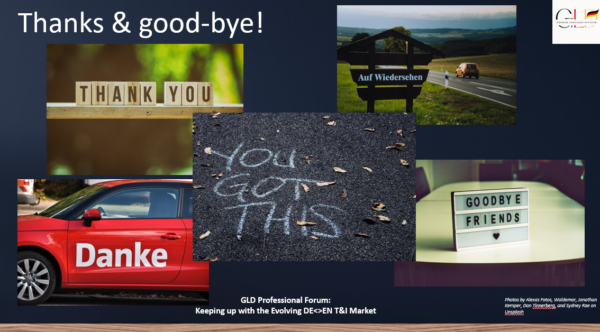
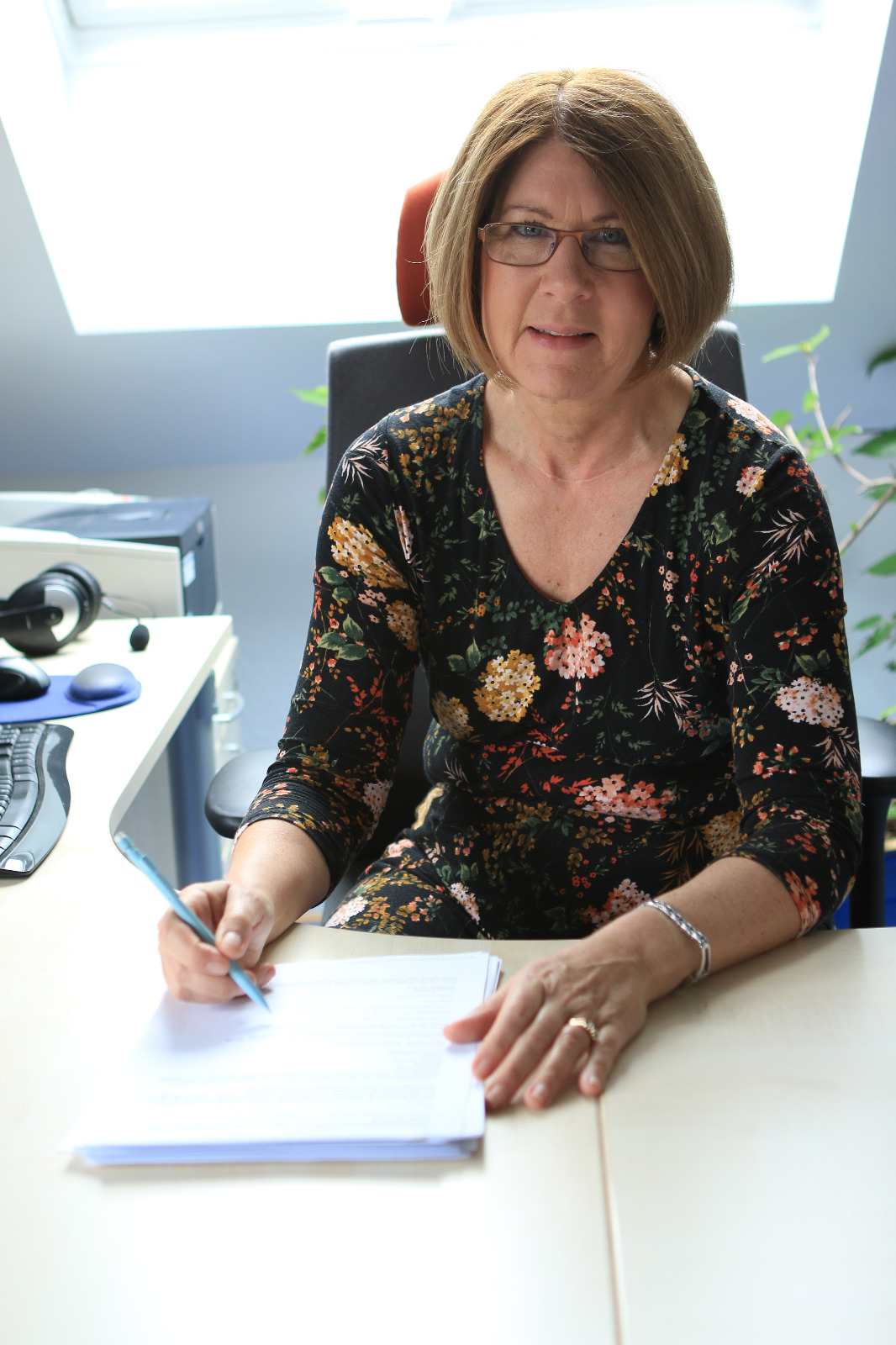
Karen Leube, a native of Pennsylvania, is a freelance translator and translator trainer based in Aachen, Germany. She served on the faculty of the universities of Heidelberg and Mainz (FTSK), where she offered courses on biomedical technology and general medical translation in cooperation with local hospitals and research institutions. Since establishing her freelance business in 2004, she has taught numerous continuing education courses for translators and interpreters. Twelve of her book translations have been published to date, including Thomas Häusler’s Gesund durch Viren (Viruses vs. Superbugs).
Karen founded and coordinated ATA’s GLD Members in Europe group from 2009 to 2019 and served as the GLD’s Assistant Administrator for two years prior to assuming the position as Administrator in 2022.
